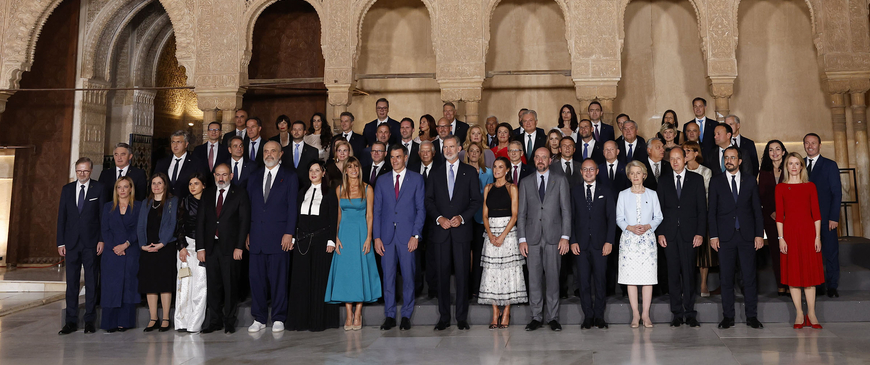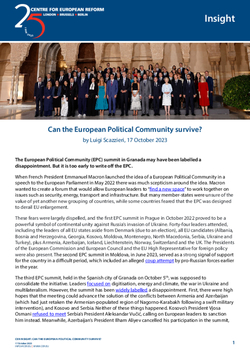
Can the European Political Community survive?
The European Political Community (EPC) summit in Granada may have been labelled a disappointment. But it is too early to write off the EPC.
When French President Emmanuel Macron launched the idea of a European Political Community in a speech to the European Parliament in May 2022 there was much scepticism around the idea. Macron wanted to create a forum that would allow European leaders to “find a new space” to work together on issues such as security, energy, transport and infrastructure. But many member-states were unsure of the value of yet another new grouping of countries, while some countries feared that the EPC was designed to derail EU enlargement.
These fears were largely dispelled, and the first EPC summit in Prague in October 2022 proved to be a powerful symbol of continental unity against Russia’s invasion of Ukraine. Forty-four leaders attended, including the leaders of all EU states aside from Denmark (due to an election), all EU candidates (Albania, Bosnia and Herzegovina, Georgia, Kosovo, Moldova, Montenegro, North Macedonia, Serbia, Ukraine and Turkey), plus Armenia, Azerbaijan, Iceland, Liechtenstein, Norway, Switzerland and the UK. The Presidents of the European Commission and European Council and the EU High Representative for foreign policy were also present. The second EPC summit in Moldova, in June 2023, served as a strong signal of support for the country in a difficult period, which included an alleged coup attempt by pro-Russian forces earlier in the year.
The third EPC summit, held in the Spanish city of Granada on October 5th, was supposed to consolidate the initiative. Leaders focused on digitisation, energy and climate, the war in Ukraine and multilateralism. However, the summit has been widely labelled a disappointment. First, there were high hopes that the meeting could advance the solution of the conflicts between Armenia and Azerbaijan (which had just retaken the Armenian-populated region of Nagorno-Karabakh following a swift military intervention), and Kosovo and Serbia. Neither of these things happened. Kosovo’s President Vjosa Osmani refused to meet Serbia’s President Aleksandar Vučić, calling on European leaders to sanction him instead. Meanwhile, Azerbaijan’s President Ilham Aliyev cancelled his participation in the summit, with Azeri officials saying this was because of its anti-Azerbaijani atmosphere. Second, several other leaders did not attend the summit. The most prominent absence aside from Aliyev’s was Turkey’s President Recep Tayyip Erdoğan’s, who was unable to attend (officially due to a cold) and therefore missed his second summit in a row. Meanwhile, Kosovo was represented by its ceremonial president rather than its prime minister. Finally, the Granada summit was also shadowed by disagreements between Spain and the UK over the former’s unwillingness to include migration – a priority for the British government – in the agenda. The final press conference was cancelled, seemingly for this reason, which gave the whole event an aura of disappointment.
The third EPC summit, held in the Spanish city of Granada on October 5th, was supposed to consolidate the initiative.
Nevertheless, it is too early to write off the EPC. First, just because the EPC could not make a concrete contribution to conflict resolution in Granada does not mean that it has no potential to do so in the future. Both the conflict between Armenia and Azerbaijan and the dispute between Serbia and Kosovo had recently escalated, and it was probably over-optimistic to expect any progress. Future EPC summits could still provide neutral forums for meetings that advance diplomatic processes, so long as the conditions for doing so exist on the ground.
Second, as with previous summits, the meeting in Granada provided an opportunity for European leaders to signal their continuing support for Ukraine, just as doubts were beginning to solidify around the continuation of US support to Kyiv. More broadly, the EPC is helping foster discussions between EU members and candidate countries on shared strategic challenges in a forum that is neutral and, unlike the accession process, does not put the candidates in a subordinate relationship to the EU. The EPC allows candidate countries to participate on an equal footing and take ownership of the agenda. The EPC can also lead to practical co-operation between candidate countries and other members. For example, the summit in Granada served as a platform for the EU and France to announce the start of training on cybersecurity for non-EU EPC members under threat.
The meeting in Granada provided an opportunity for European leaders to signal their continuing support for Ukraine.
Third, the EPC is proving useful to allow the UK and EU countries to discuss shared challenges in a much-needed neutral space. UK-EU relations have improved after the Windsor Framework on Northern Ireland but UK-EU dialogue is not always smooth. The Granada summit provided an opportunity to signal closer co-operation on irregular migration and the fight against people smugglers between the UK and some of its European partners. British Prime Minister Rishi Sunak and his Italian counterpart Giorgia Meloni held a side summit on the topic with a smaller group of countries, including the Netherlands, France, Albania and Commission President Ursula von der Leyen.
Finally, the EPC’s format is unique and fills a gap. The EPC’s membership is very broad and all members participate as equals. The agenda of EPC meetings leaves a lot of time for free-flowing discussions, as there is no need for leaders to agree on a final communiqué, which politicians appreciate. At the same time, EPC summits allow leaders to schedule many bilateral and small group meetings in a short space of time, and therefore serve a similar function to leaders’ meetings within the framework of the UN General Assembly.
While it is too early to write off the EPC, expectations of what it can achieve should be reduced. After Macron floated the notion of the EPC, there were some ideas around institutionalising it, perhaps with a budget or a secretariat. But it soon became clear that there was no appetite amongst most EPC members to give it any of these attributes. On the contrary, there is a broad consensus that the EPC should remain a light and informal framework, and that its key added value is in fostering more interaction between a broad group of leaders. The EPC cannot implement any decisions that leaders take at its summits, and therefore cannot advance any co-operation projects on its own. But the EPC can push issues up the political agenda, and its summits can be used by leaders as a platform to make public announcements. For example, at the summit in Moldova many Western countries announced support for the country, and some countries used the Granada summit to announce additional assistance for Ukraine. The EPC can also incubate co-operative projects that can be taken forward by groups of countries or by other organisations like the EU or NATO.
While it is too early to write off the EPC, expectations of what it can achieve should be reduced.
The informal nature of the EPC means that its future hinges above all on whether a critical mass of leaders continue to see value in attending its summits. That depends in large part on what future host nations make of it. The UK is one of the leading advocates of the EPC’s success and has every incentive to make sure that the summit it will host in March next year is a success. Britain would be wise not to make migration the sole focus of the summit, as this would be divisive. The next planned host is Hungary, as it will hold the EU Presidency in the second half of 2024. There is a risk that Budapest could choose to focus the discussion on issues that many other members see as controversial.
To ensure continuity, the EPC would benefit from some ‘light’ institutionalisation that could allow for a greater degree of follow-though. One idea that is gaining ground is that of a system of presidency trios, whereby the last presidency, the current one and the following one work together. Another is that of meeting of government advisers (sherpas) more regularly, or of holding more informal discussions with experts and officials in between summits.
To ensure continuity, the EPC would benefit from some ‘light’ institutionalisation that could allow for a greater degree of follow-though.
The Granada summit is unlikely to be the beginning of the end for the EPC. But the EPC’s long-term future remains unclear. Russia’s war on Ukraine and EU enlargement loom large over the EPC, and its evolution will depend on both. So long as the war goes on, and as long as enlargement is in progress, there is a good chance the EPC will continue to be valuable to foster pan-European strategic discussions. But once the war ends, European leaders may consider the EPC redundant and wind it down, especially if the EU has succeeded in enlarging.
Luigi Scazzieri is a senior research fellow at the Centre for European Reform.


Add new comment